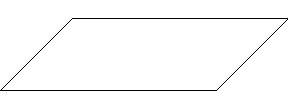Parallelograms
|
Mentor: Does anyone recall or know what we call it when 2 lines run side-by-side and never cross? Student: Yes. Lines like that are called parallel lines. Mentor: Great! We've already learned that quadrilaterals have how many sides? Student: Four. Mentor: That's right and we call quadrilaterals with parallel sides parallelograms. Student: But, how can all the sides be parallel if a quadrilateral is a polygon and is all closed off? Mentor: Great thinking! I guess what I should have said is that a parallelogram has two pairs of opposite sides that are parallel, like this:

Mentor: Good. Now I want to tell you about a special kind of parallelogram. It's called a rhombus. A rhombus is a parallelogram, but all four sides have the same length. Student: So a rhombus is a type of parallelogram just like a banana is a type of fruit. Mentor: Right, we should not say that all parallelograms are rhombii, just like we don't say that all fruits are bananas. Student: I think I understand what parallelograms and rhombii are. Mentor: Wonderful! Now we can talk about rectangles! |
